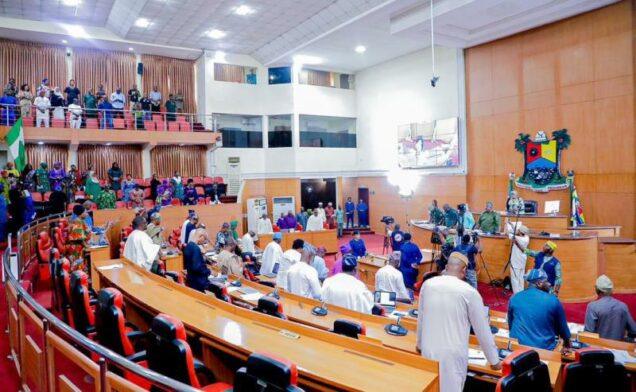In a dramatic development at the Lagos State House of Assembly, members and staff have resisted efforts by security operatives from the Department of State Security (DSS) and the Nigeria Police to seal off the chambers. This unexpected standoff comes in the wake of ongoing political turbulence following the removal of Mudashiru Obasa as the Speaker of the House.
Early Monday morning, security personnel arrived at the Assembly complex in Alausa, Ikeja, with the intent to lock down the offices of the current Speaker Mojisola Meranda, her deputy, and the House clerk. The action was reportedly linked to the contentious removal of Obasa, which has sparked significant unrest within the Assembly and the broader political landscape of Lagos.
According to reports, the move to seal the chambers was met with immediate resistance from both Assembly members and staff. There were accounts of physical confrontations where staff members and some lawmakers stood their ground, preventing the security operatives from completely shutting down the legislative operations as was displayed in a viral video.
Read Also: Tension in Lagos Assembly: Heavy security lockdown sparks political unrest
The resistance highlights the deep divisions within the Assembly, where loyalties are split between supporters of the ousted speaker and those backing Meranda, who was elected in his stead. The crisis has not only thrown the Assembly into chaos but has also raised questions about the autonomy of legislative bodies in Nigeria.
The backdrop to this conflict is the impeachment of Mudashiru Obasa on January 13, 2025, an event described by some as a “coup” within the legislative chamber. Since his removal, Obasa has challenged the legality of his ousting, asserting that he remains the rightful Speaker. This claim has led to a legal battle, with Obasa taking the matter to court, arguing that the procedures followed during his impeachment were unconstitutional.
The sealing of the Assembly’s chambers appears to be an attempt to halt proceedings until a resolution or perhaps to enforce a kind of administrative lockdown in response to the ongoing leadership dispute. However, this has only intensified the conflict, with staff and members showing a strong resolve to continue their legislative duties.
The situation has also highlighted the role of external security forces in internal political matters, raising concerns about political interference and the sanctity of democratic institutions. Critics argue that the involvement of the DSS and police in such a manner could set a dangerous precedent for legislative independence.
As the standoff continues, there is a palpable sense of urgency among Lagosians for a peaceful resolution. The Governance Advisory Council (GAC), the highest decision-making body of the All Progressives Congress (APC) in Lagos, has been called upon to mediate, but so far, the situation remains volatile.
This incident, coupled with recent political developments in Lagos, signifies a tumultuous period for one of Nigeria’s most influential state assemblies. The outcome of this confrontation could have significant implications not only for the state’s governance but also for the broader narrative of political stability in Nigeria.
As the day progresses, all eyes are on how this unprecedented resistance will unfold, with many hoping for a swift and democratic solution to restore order and functionality to the Lagos State House of Assembly.






